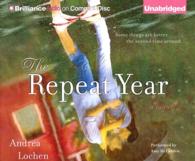- ホーム
- > 洋書
- > 英文書
- > Politics / International Relations
Full Description
Voters and Voting in Context investigates the role of context in affecting political opinion formation and voting behaviour. Building on a model of contextual effects on individual-level voter behaviour, the chapters of this volume explore contextual effects in Germany in the early twenty-first century.
The volume draws upon manifold combinations of individual and contextual information gathered in the German Longitudinal Election Study (GLES) framework and employ advanced methods. In substantive terms, it investigates the impact of campaign communication on political learning, effects of media coverage on the perceived importance of political problems, and the role of electoral competition on candidate strategies and perceptions. It also examines the role of social and economic contexts as well as parties' policy stances in affecting electoral turnout. The volume explores the impact of social cues on candidate voting, effects of electoral arenas on vote functions, the role of media coverage on ideological voting, and effects of campaign communication on the timing of electoral decision-making.
Voters and Voting in Context demonstrates the key role of the processes of communication and politicization in bringing about contextual effects. Context thus plays a nuanced role in voting behaviour. The contingency of contextual effects suggests that they will become an important topic in research on political behaviour and democratic politics.
Contents
1: Harald Schoen, Sigrid Roßteutscher, Rüdiger Schmitt-Beck, Bernhard Weßels, and Christof Wolf: Voters and Voting in Context: An Introduction
2: Julia Partheymüller: Agenda-setting Dynamics During the Campaign Period
3: Agatha Rudnik and Harald Schoen: ust Like Leaves in the Wind? Exploring the Interplay of Media Coverage and Personal Characteristics in Affecting Issue Salience
4: Aiko Wagner and Elena Werner: TV Debates in Medial Contexts: How and When Do TV Debates Have an Effect on Learning Processes?
5: Bernhard Weßels: Electoral Competition, Candidates' Campaign Styles, and the Personalization of the Vote
6: Anne Schäfer and Rüdiger Schmitt-Beck: A Vicious Circle of Demobilization? Context Effects on Turnout at the 2009 and 2013 German Federal Elections
7: André Förster and Malte Kaukal: Economic Performance and Turnout in Regional Perspective: A Multilevel Analysis of German Districts
8: Alexander Wuttke: When the World Around you is Changing: Investigating the Influence of Alienation and Indifference on Voter Turnout
9: Heiko Giebler: Not Second-Order, but Still Second-Rate? Patterns of Electoral Behavior in German State Elections
10: Sigrid Roßteutscher, Ina Bieber, Lars-Christopher Stövsand, and Manuela Blumenberg: Candidate Perception and Individual Vote Choice: The Role of Social Cues
11: Matthias Mader and Harald Schoen: Ideological Voting in Context: The Case of Germany During the Merkel Era
12: Maria Preißinger: Always Late? Stability and Change in Individuals' Time of Vote Decisions
13: Harald Schoen, Sigrid Roßteutscher, Rüdiger Schmitt-Beck, Bernhard Weßels, and Christof Wolf: Conclusion








